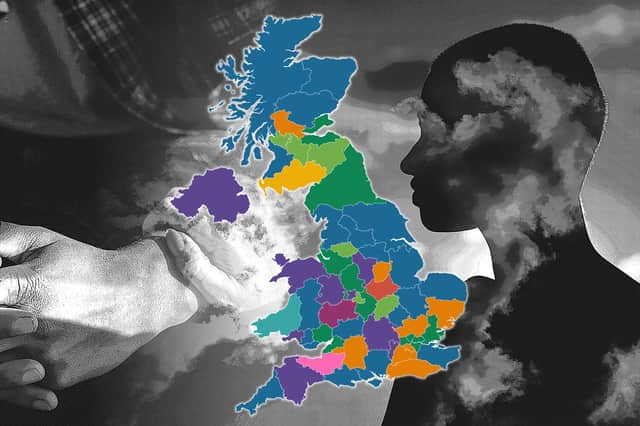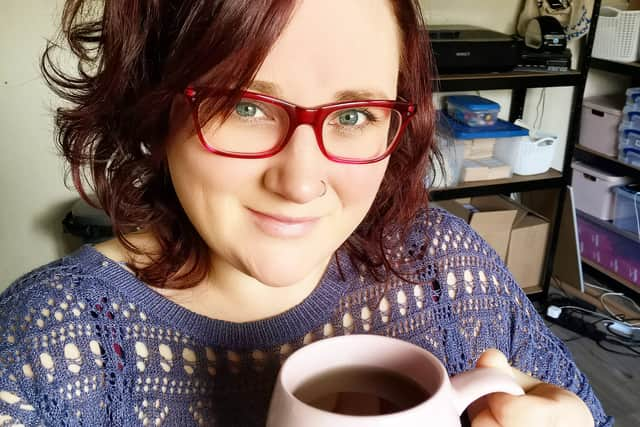Mental health: major study into UK’s hidden pandemic reveals why people don’t ask for help and support


A major study into Britain’s mental health pandemic reveals why so many people suffer in silence.
While treatment services have faced unprecedented demand, there are also concerns for the hidden multitudes who never seek help.
Advertisement
Hide AdAdvertisement
Hide AdThe new study, run by the international non-profit Surgo Ventures and part-funded by the UK Government, shows that reasons for avoiding professional care vary from community to community.
Worries about the financial costs of mental illness are more common in the home counties, for instance, while people in Yorkshire are more likely to dislike opening up about their feelings.
‘When the car hit the kerb, the thought of my children popped into my head’


Kelly Robinson-Key is a mother of two children. Her son, 9, has autism and her daughter, 6, had a serious health condition when she was younger.
She had given up her career to care for her son and the family had moved from Essex to Carmarthenshire in Wales so they could still afford a family home.
Advertisement
Hide AdAdvertisement
Hide AdAs a result Kelly had found herself feeling isolated and unsupported, as the family battled to secure diagnoses and treatment for her children.
The 33-year-old said: “I ended up just not wanting to be alive any more. I wanted the noise in my mind to stop. It was so busy all the time.
“I had a lot of intrusive thoughts and I would wake up quite terrified most days. I couldn’t look out of windows, I kept thinking there were people outside.
“I was in this spiral and I couldn’t tell anybody.”
In 2017, when her children were in school, Kelly said she went to drive off a bridge.
Advertisement
Hide AdAdvertisement
Hide AdShe said: “When the car hit the kerb, the thought of my children popped into my head and I pulled the car back into the road.”
That day, she finally opened up to her husband. He encouraged her to keep the lines of communication open by sending him regular messages each day telling him how she was feeling.
Kelly found she could open up best when she wrote in rhyme - a habit which led to a new career as a poet and educational writer.
Kelly said she would urge others to reach out for help.
She said: “When you are in the darkest place, you need to find that spark to find that way out. I didn’t realise poetry would do that for me.
Advertisement
Hide AdAdvertisement
Hide Ad“I wouldn’t want anyone to feel like I did, feeling stuck and like there is no way out.”
‘Shocking reflection of barriers to mental health care’
The study, based on a survey of more than 17,000 people across the UK and shared exclusively with NationalWorld, reveals:
- One in three showed possible signs of either depression or anxiety;
- One in five wouldn’t seek professional care for at least six months, if ever;
- Barriers to asking for help varied depending on the towns or cities people lived in, as well as their gender, age and ethnicity.
With official figures showing rates of depression doubling in the wake of the Covid-19 pandemic, it is hoped the research will help health professionals get crucial support to those who need it.
Surgo Ventures’ CEO and co-founder, Dr Sema K Sgaier, said: “The fact that one in five people would suffer silently with mental health difficulties is a shocking reflection of barriers to mental health care in the UK.
Advertisement
Hide AdAdvertisement
Hide Ad“What also stood out was how widely the reasons varied from community to community.
“Health leaders who want to encourage people to seek care will need to pursue tailored, hyper-local strategies for it to work.
“And our data can help provide these leaders with a roadmap on what to do in their communities.”
The Department for Health and Social Care said the research would “help inform what actions we should take to ensure people who need support can, and do, access it”.
‘I was being a young male, not wanting to admit that I needed help’


Advertisement
Hide AdAdvertisement
Hide AdLee Chambers, a business psychologist and wellbeing consultant from Preston, had a mental health crisis when he was at university aged 20.
The 36-year-old father-of-two said: “It got so serious I ended up locking myself in my university dorm for two weeks and being extracted by security and being taken home.”
But he said at the time he felt he couldn’t ask for therapy, wanting instead to work his way through it on his own.
“I was being a young male, not wanting to admit that I needed help and support.”
Advertisement
Hide AdAdvertisement
Hide AdHe later had more “dark days”, including when, in 2014, a form of arthritis left him unable to walk for 11 months.
Lee said as someone trained in psychology, he had often felt he had to “fix” himself.
He finally decided to get therapy, 15 years after his first mental health crisis.
He said: “To people who are struggling, I say, don’t wait 15 years like me. Just take that step.”
Advertisement
Hide AdAdvertisement
Hide AdLee said it was often particularly hard for black people to seek help.
He said: “Black people struggling with their mental health are more likely to end up in trouble with the police, they are more likely to be stigmatised.
“There are older people in the community who don’t recognise mental health as a thing, they still see it as people being crazy, people being possessed or people losing their mind.”
Lee said there were too few black therapists and there also needed to be more young black role models who were open about mental health.
Advertisement
Hide AdAdvertisement
Hide AdHe said: “Asking for help, assistance or support is actually a strong thing to do. It shows a level of courage and bravery, not the other way around.”
Younger adults more worried about wasting time of medical staff
Surgo Ventures’ study was funded by the Department for Digital, Culture, Media and Sport and philanthropy organisation Founders Pledge.
The resulting UK Mental Health Data Explorer shows the proportion of people who would suffer silently with a mental health problem varies by area.
The percentage who would delay seeking care for at least six months ranged from 8% in Scotland’s Forth Valley to 26% in Shropshire and Telford and Wrekin, in the West Midlands.
Advertisement
Hide AdAdvertisement
Hide AdAge and gender differences also emerged in the study’s findings.
The most common barrier to seeking help cited by men was the fear of being put in hospital against their will, while for women it was a dislike of talking about their feelings, emotions or thoughts.
Younger adults were more likely to be worried about wasting the time of medical staff. Some 17% of those aged 18-24 cited this as a barrier, nearly three times the rate seen in over-65s.
The study revealed widespread gaps in knowledge about mental health. Nearly a quarter of people (23%) did not know or believe that depression or anxiety are mental illnesses.
Advertisement
Hide AdAdvertisement
Hide AdThe proportion of black respondents who did not know or believe that depression or anxiety are mental illnesses was 43%, nearly double the rate of white people (22%).
‘The pandemic has taken a great toll on the mental health of the nation’
Rates of depression among British adults doubled from 10% before the coronavirus pandemic to 21% in early 2021, according to the Office for National Statistics.
Subodh Dave, Dean of the Royal College of Psychiatrists, said the Covid-19 pandemic had led to “unprecedented demand on mental health services”.
He said it was “essential to work collaboratively across society to remove the stigma for those struggling with their mental health so that they can come forward when they need support”.
Advertisement
Hide AdAdvertisement
Hide AdA spokesperson for the Department for Health and Social Care said: “We will be launching a national conversation to inform the development of a new long term Mental Health Strategy later this year.
“This kind of research will help inform what actions we should take to ensure people who need support can, and do, access it.
“Mental health services are there for those who need them, so if you need support or are concerned about someone else, please reach out for help.”
Vicki Nash, head of policy at the mental health charity Mind, said: “The pandemic has taken a great toll on the mental health of the nation, with many people experiencing a worsening of pre-existing mental health problems while others are struggling with their mental health for the first time.
Advertisement
Hide AdAdvertisement
Hide Ad"What is needed urgently is a cross-Government plan to tackle the mental health backlog, alongside additional funding to support people experiencing mental health problems earlier on before they reach crisis point and treatment becomes both more intensive and expensive.”
- If you are affected by the issues raised, the following organisations may be able to offer help or advice: The Mind Infoline: 0300 123 3393 or email [email protected]; Samaritans: 116 123 or email [email protected]; The Rethink Mental Illness Advice Line: 0808 801 0525 or via its web chat service.
A message from the editor:
Thank you for reading. NationalWorld is a new national news brand, produced by a team of journalists, editors, video producers and designers who live and work across the UK. Find out more about who’s who in the team, and our editorial values. We want to start a community among our readers, so please follow us on Facebook, Twitter and Instagram, and keep the conversation going. You can also sign up to our newsletters and get a curated selection of our best reads to your inbox every day.
Comment Guidelines
National World encourages reader discussion on our stories. User feedback, insights and back-and-forth exchanges add a rich layer of context to reporting. Please review our Community Guidelines before commenting.
